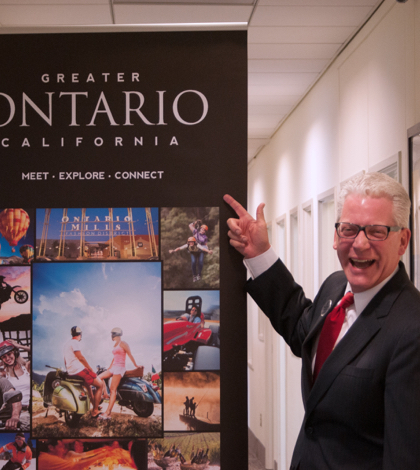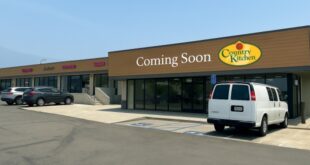Krouse, head of the Greater Ontario Convention and Visitors Bureau and Ontario Convention Center, left a similar job in Los Angeles Tourism so he could build his own operation. In just about every way, he says, Ontario has proved to be a better job, with more cooperation and not as many political battles to fight.
Three years ago, when he was still a senior vice president with the Los Angeles Tourism and Convention Board, Michael Krouse saw the writing on the wall.
His boss, Mark Liberman, was leaving. Although Krouse had worked there for 10 years, and had done a solid job overseeing convention bookings, client services and hotel operations, he got a sense that it was time to move on.
“Mark was the person who hired me, and at that level when the person who hires you leaves it’s usually not a bad idea to look around,” Krouse said. “Besides, I’d done as much there as I could do, and I wanted to build my own operation. In Los Angeles, I couldn’t do that, because everything was already established.”
As it turned out, the Greater Ontario Convention and Visitors Bureau was looking for someone to oversee day-to-day operations at the Ontario Convention Center and promote the region as a tourist destination.
Krouse, who will turn 54 this month, had more than 25 years experience in hotel sales and hotel management. He took over as president and chief executive officer of the Greater Ontario Convention and Visitors Bureau in October 2012, and has yet to look back.
“It’s a natural fit,” Krouse said. “Los Angeles is very political, with a lot of obstruction, but here the atmosphere is more cooperative. The people on the [Ontario] city council seem to get along, and they want to work together.”
Krouse was hired by the city council on the recommendation of then-City Manager Chris Hughes. One council member says it could not have made a stronger choice.
“Michael has done an incredible job,” Mayor pro tem Alan Wapner said. “We’ve had a serious drop in passenger traffic at Ontario International Airport during the past few years, as everyone knows, but our [hotel] transit occupancy tax has gone up during that time. That’s mostly because of Michael and the convention business he’s brought to the city.
“I don’t see how we could have made a better hire.”
Krouse spoke with iebusinessdaily.com last week about his two and a half years on the job, what he believes are his major accomplishments and how he has approached selling Ontario as a tourist destination.
Q: What part of the job has surprised you the most?
A: The amount of cooperation I’ve gotten from the business community. In a job like this you expect to get some resistance when you want to try new things, but that hasn’t been the case here. The cooperation has been incredible.
Q: Besides Ontario, what areas are you responsible for?
A: We promote Ontario and Rancho Cucamonga, which combined have about 60 hotels and 6,000 hotel rooms. That’s more hotels and hotel rooms than in downtown Los Angeles. No one believes me when I say that, but it’s true.
Q: Is there anything you’ve implemented that you’re especially proud of, something you can point to as a major success?
A: We’ve added some events, like the Route 66 Cruisin’ Reunion that’s held in September, and we’ve enhanced some other things, like Christmas on Euclid, to make them more attractive. We also put in a two percent assessment on our hotel room rates by creating an assessment district. That started six months after I got here and it’s made a lot of revenue: about $1.8 million during its first year, and we expect it to generate about $2.5 million this year. You could call that our biggest success.
Q: Was that a difficult sell?
A: Surprisingly, no. We had to get it passed both city councils, but that wasn’t a problem. I expected some resistance from the hotel people because it seems like a tax, even though it isn’t, but they were cooperative. Now we have [hotels] in other areas asking us how we did it.
Q: What’s the difference between what you did in Los Angeles and what you’re doing in Ontario?
A: It’s easier to get things done in the Inland Empire. In Los Angeles, everything is in place. You can’t build anything new there like you can here, which is why I wanted this job in the first place. Also, you have to fight a lot more political battles in Los Angeles.
Q: Probably most people don’t think of Ontario as a tourist destination, like Los Angeles or Orange County. How do you market it as one?
A: It’s true that you don’t have anything like Disneyland or Universal Studios to sell. There are Ontario Mills and the local wineries, but those aren’t really tourist destinations. People don’t come here specifically to see them, they see them usually after they’ve gone somewhere else first. Although the Mills does attract more people every year than Disneyland.
Q: So how do sell them as places to visit?
A: You sell Ontario as a place that’s near Disneyland and Universal Studios and Los Angeles. You say that it’s only a one-hour drive from those places, and that you can stay in Ontario or Rancho Cucamonga and experience those places without having to deal with the traffic in Los Angeles. That’s a strong selling point.
Q: How important is that Ontario get control of Ontario International Airport away from the airport’s owner, Los Angeles World Airports?
A: It’s very important. If we don’t get the passenger count up we’re going to have a lot of empty hotel rooms. We’ll be overloaded with hotels. I leave that battle to the politicians because I’m not directly involved with it, but I do follow it closely.
Q: What are your long-term goals?
A: Just to keep doing everything we can to fill up the hotels. Things have improved, but we still aren’t back to pre-recession levels, either at the airport or in the hotels. There’s a lot of work to be done.
 IE Business Daily Business news for the Inland Empire.
IE Business Daily Business news for the Inland Empire.


